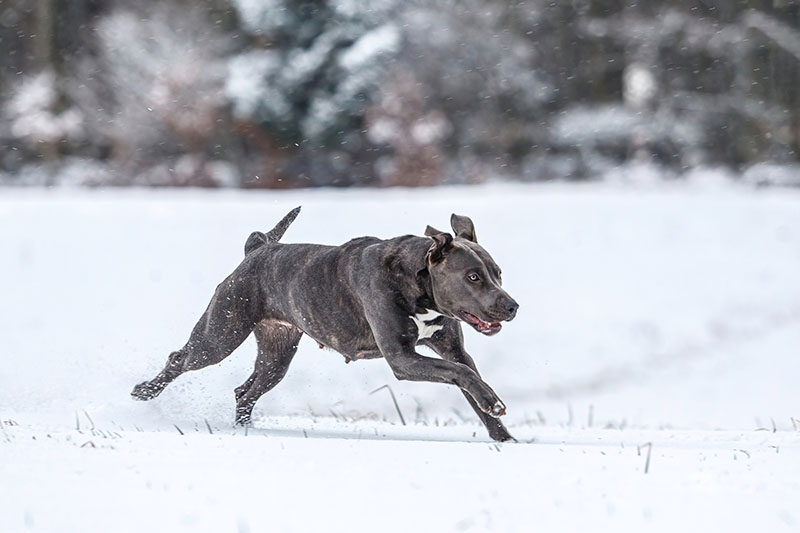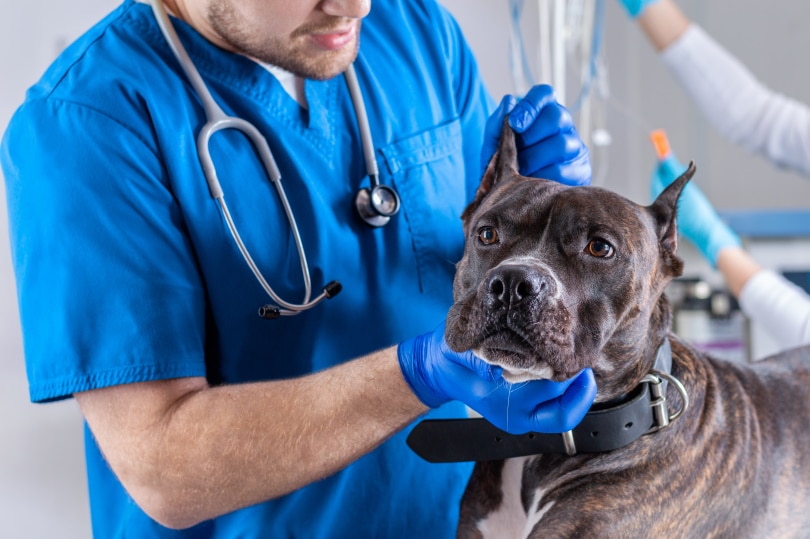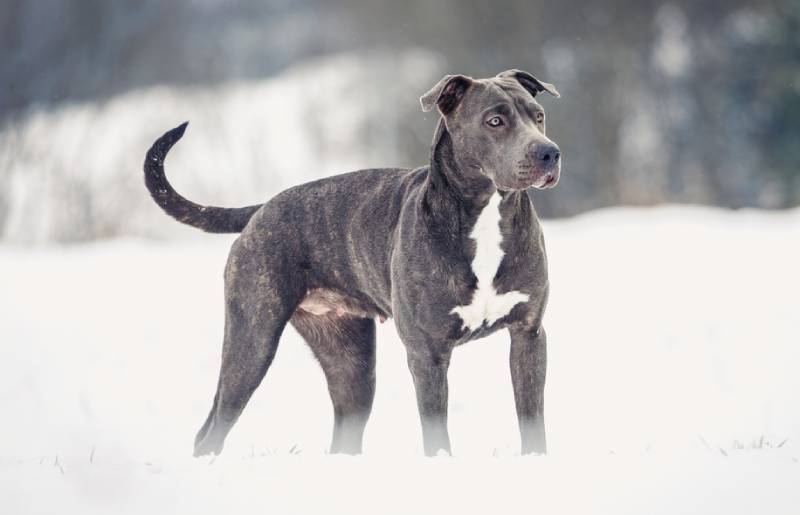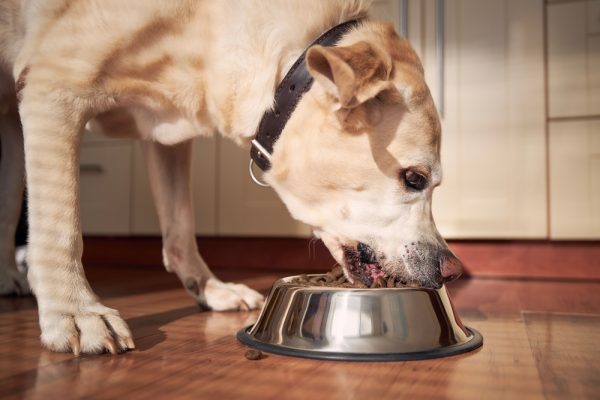In this article
If your Pitbull loves the freedom of being outside in your yard or going on walks with you in the park, little will cause them to pass up on the opportunity, even when temperatures drop. Of course, as a pet parent, you want your dog to be able to enjoy their day by playing and getting the exercise they need, but if temperatures drop below 45 degrees Fahrenheit, you should reduce their time outside. However, temperatures below 32 degrees Fahrenheit start to become dangerous for some Pitbulls, and they shouldn’t be left outside alone.
Temperatures below 20–25 degrees Fahrenheit could cause serious problems for your dog, such as hypothermia or frostbite, and going outside isn’t recommended. It’s hard to give a definite answer for how cold is too cold for your Pitbull because their age, weight, health status, and the type of weather conditions accompanying the cold all play a role.

Factors That Influence How Your Pitbull Responds to the Cold
Dogs of different breeds respond to the cold differently, and so does one Pitbull to another. A Pitbull has a short coat, which doesn’t protect them from the cold very well. Although no Pitbull should be left unsupervised in freezing temperatures, we’ve listed a few factors that may cause one Pitbull to be more sensitive to the cold than another.

Weight
The size of a Pitbull varies from medium to large. However, they’re very muscular and can weigh up to 80 pounds. Although they have short coats, their strong, muscular bodies give them an advantage in the cold because muscle produces heat. It also provides additional protection to preserve core temperature. Therefore, a heavy-muscled Pitbull will respond to the cold better than a dog with less muscle mass.
Age & Health Status
Puppies and senior dogs struggle to regulate their body temperature and should not be left alone in chilly weather. As a general rule, they shouldn’t be left outside in temperatures below 45 degrees Fahrenheit. Unhealthy dogs also struggle to retain heat and become cold much faster than healthy dogs.
Weather Conditions
A low temperature isn’t the only factor to consider when letting your dog outside. Some chilly days have bright, sunny skies, and although your Pitbull will likely be alright in low temperatures, they’ll feel the cold more if it is accompanied by wind, rain, snow, fog, and cloud cover.

Signs That Your Dog Is Too Cold
If your Pitbull loves to dig and run in the snow, you can let them, as long as you supervise them and ensure they’re staying active. If your dog is running and playing, their body is generating heat, but if they’ve exhausted themselves and are resting, bring them inside to prevent them from becoming cold and stiff.
While you’re outside with your dog, watch their behavior and look for signs of discomfort. You’ll know they’re too cold if they start to slow down, don’t want to walk anymore, are shivering, whimpering, looking for shelter, limping, and becoming increasingly anxious.
If your dog has become too cold and you see these signs, bring them inside immediately and dry them off with a towel. Wrap them up in a big blanket or get them to lie down in front of the heater to warm up.
If you are concerned about the health and well-being of your pet, seek veterinary advice for the best course of action.
If you need to speak with a vet but can't get to one, head over to PangoVet. It's our online service where you can talk to a vet online and get the advice you need for your dog — all at an affordable price!


Risks of Leaving Your Dog Out in the Cold
Although leaving your adult Pitbull outside unsupervised in temperatures of 32 degrees Fahrenheit isn’t advised, they might be okay, but it depends on the weather conditions accompanying the cold, the degree of physical activity of your dog, and their health status. However, the real danger arises when temperatures drop below 20 degrees Fahrenheit, as even your big, muscular Pitbull can be at risk of hypothermia or frostbite.
Regardless of whether the sun is out, your dog is wearing a jersey, or they have their own wooden shelter, you should not leave your dog outside in below-freezing conditions. If you see a dog left vulnerable outside in these temperatures, don’t be afraid to contact your local animal control agency and report what you see; it might save the dog’s life.
Hypothermia
Hypothermia is a risk for dogs left out in freezing temperatures. It sets in when a dog’s body temperature decreases to 98 degrees Fahrenheit, and the signs can include:
- Trembling
- Cold paws
- Lethargy
- Blue or pale gums
- Inability to walk properly
- A slow heart rate
- Trouble breathing
Severe cases of hypothermia will cause dogs to collapse, become comatose, and can be fatal. This is an emergency case.
Frostbite
Frostbite is another risk for dogs left outside in freezing temperatures. It happens when the extreme cold causes tissue damage. The blood vessels in a dog’s tail, ear tips, and paws are restricted in an attempt to keep their core warm. The lack of blood flow to these areas due to the cold can cause them to freeze, and severe tissue damage may occur.
- The extremities turning gray, blue, or black
- Coldness in their extremities
- Brittleness in their extremities
- Pain
- Swelling
- Blisters
Frostbite goes hand-in-hand with hypothermia, so treat the hypothermia first by attempting to increase the dog’s body temperature by wrapping them in blankets and placing heat sources around them. Then, youl need to get the dog to a vet, where they will receive the necessary treatment. In very severe cases, surgery or amputation to remove the damaged tissue might be necessary.


How To Keep Your Dog Safe from the Cold
Keeping your dog in your heated home is the best way to keep them safe from the cold, but there are times when they’ll need to be let outside for a bit of exercise or to relieve themselves.
- Clean off your dog’s feet and stomach after walks and allow them to dry thoroughly.
- Put booties over your dog’s feet.
- Get a coat for them to wear outside.
- Ensure your dog is well-fed and well-hydrated.
- Move their bed away from any drafts.

Conclusion
Different dogs have varying degrees of tolerance when it comes to the cold winter weather, but your Pitbull shouldn’t be left outside unsupervised in temperatures of 32 degrees Fahrenheit or less. If your dog is left outside in low temperatures, they will be at risk of hypothermia and frostbite, so keep them inside and only take them outside for short walks. You can add booties to their paws and dress them in a coat for extra warmth.
See also:
- Why Is My Pitbull Snoring? 10 Vet-Approved Common Reasons
- 10 Common Pitbull Skin Issues & How to Treat Them (Vet Answer)
Featured Image Credit: Annabell Gsoedl, Shutterstock























